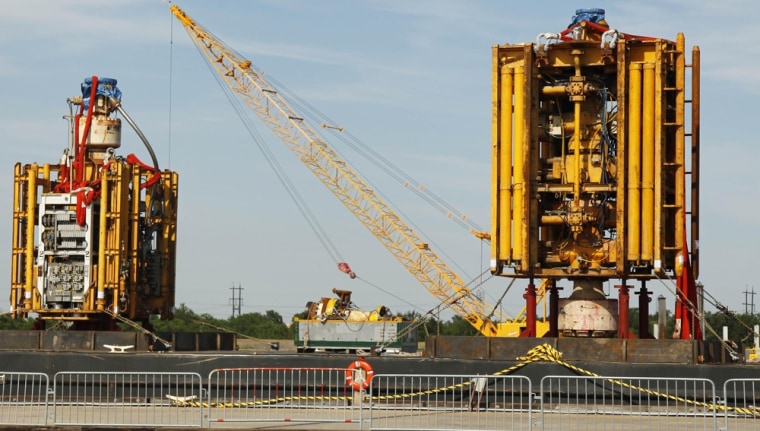What's expected to be the costliest litigation in U.S. history formally got under way on Thursday, as a federal judge began sorting through thousands of lawsuits in the BP oil disaster — as well as incriminations that the key piece of evidence was being mishandled.
More than 400 people packed the courtroom and two overflow rooms to hear District Judge Carl Barbier talk about the types of legal proceedings in play, including potential civil and criminal lawsuits from the U.S. Department of Justice.
"There will be thousands of cases consolidated in this court," he said. "One of the tasks we will have will be how to organize and structure and coordinate all the related things going on."
The judge set aside the months of October and November in 2011 for the first major trial in the case, which will be to determine how liability will be shared among the parties.
But, he added, "it's never too late to settle."
BP and its partners are being sued by shrimpers, commercial fishermen, charter captains, property owners, environmental groups, restaurants, hotels and others who have claimed economic losses since the spill. Relatives of the 11 workers killed in the blast also have sued.
Even before the hearing, BP, Transocean and other companies being sued were fighting among themselves and with the U.S. government over examining the enormous, 380-ton blowout preventer that failed to stop the spill.
It is now sitting on a pier at a NASA facility in New Orleans but cannot be moved inside a nearby hangar because the sheer weight of the device would destroy the road leading to the shelter. The device was raised from the sea floor Sept. 4 and could provide important clues about what happened in the disaster.
Michael Underhill, the Justice Department's attorney in the civil lawsuit, earlier told Barbier that a steel pad must be put in place to make sure the device does not collapse the dock where it is sitting.
The companies being sued are upset over the government's plans to preserve and test the blowout preventer. They complained unsuccessfully to the judge earlier this month about the government shipping the device to the NASA facility, which they said is not equipped to house or test it.
Transocean wanted the blowout preventer sent to a facility in Texas with which it does business, but the judge denied the request. Transocean said it worried that delays in examining the inner workings of the device would cause components to corrode, but the government's expert dismissed those concerns.
"You're bringing the mountain to Muhammad rather than Muhammad to the mountain," said Daniel Farr, a Transocean employee. "It's a lot of equipment to be moved and preparation to be done."
Lawsuits by the bundle
Back in the courtroom, the various sides went to court on Thursday having agreed to break the lawsuits into bundles, such as lawsuits by injured rig workers and claims by businesses.
But Barbier faces the task of stitching together widely divergent interests, including those of the companies involved.
BP has set up a $20 billion fund to pay claims stemming from the spill, and it has hired the Obama administration's former executive pay czar, Kenneth Feinberg, to administer it.
Those hurt by the spill have urged the court to move to trial as quickly as possible. They want BP and its co-defendants, including Transocean and Halliburton, to turn over evidence such as contracts and e-mails in the coming weeks.
A group of attorneys from Texas who represent injured rig workers has broken away from the other plaintiffs and wants the court to move even faster.
The defendants have argued that people who lost income or business from the spill cannot sue until they give BP's fund a chance to pay their claims.
The U.S. government has asked that any lawsuits it brings be hived off from the rest, but environmentalists want those lawsuits grouped with theirs.
In addition to the tactical issues, values must be set on claims.
